
|
 1908 . Oil on canvas
1908 . Oil on canvas
 Private Collection
Private Collection
Actual Size (W x H): 112cm x 145cm [ 44.13" x 57.13" ]
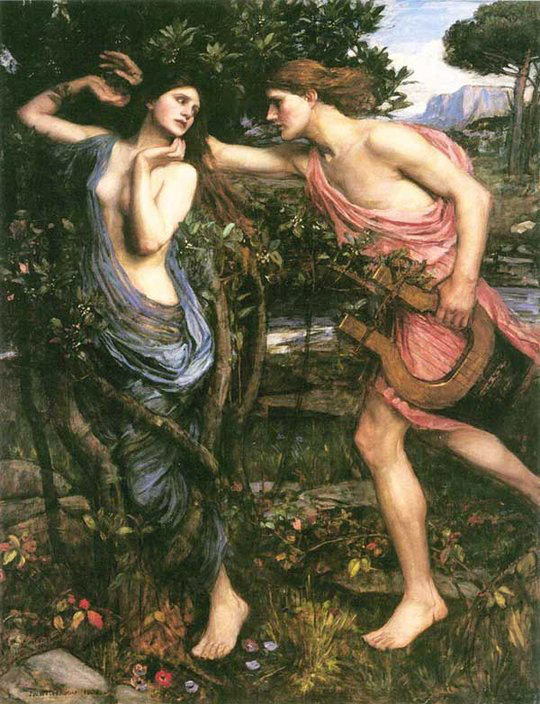 John William Waterhouse: Apollo and Daphne - 1908
John William Waterhouse: Apollo and Daphne - 1908
» View Larger Scan
» Create As Calendar
So ran the god and girl, one swift in hope, The other in terror, but he run more swiftly, Born on the wings of love, gave her no rest, Shadowed her shoulder, breathed on her streaming hair.
Her strength was gone, worn out by the long effort Of the long flight; she was deathly pale, and seeing The river of her father, cried 'O help me, If there is any power in the rivers, Change and destroy the body which has given Too much delight!' And hardlt had she finished, When her limbs grew numb and heavy, her soft breasts Were closed with delicate bark, her hair was leaves, Her arms were branches, and her speedy feet Rooted and held, and her head became a tree top, Everything gone except her grace, her shining.
Apollo loved her still. He placed his hand Where he had hoped and felt the heart still beating Under the bark; and he embraced the branches As if they still were limbs, and kissed the wood, And the wood shrank from his kisses, and the god Exclaimed: 'Since you can never be my bride, My tree at least you shall be! Let the laurel Adorn, henceforth, my hair, my lyre, my quiver: Let Roman victors, in the long procession, Wear laurel wreaths for tryumph and ovation. Beside Augustus' portals let the laurel Guard and watch over the oak, and as my head Is always youthful, let the laurels always Be green and shining!' He said no more. The laurel, Stirring, seemed to consent, to be saying Yes. Ovidio, Metamorphoses The story of Daphne is an example of an etiological myth, one that is strongly explanatory of why certain things in their culture were a certain way. There are many examples of Greek myths that explain why certain religious rituals were performed, why some peoples may be named what they are, or even why varying objects, plants and animals were symbols of their gods. The gods were known for punishing mortals for offending them, but occasionally they punished each other. The gods were a vengeful folk, and they did not take kindly to being insulted, by mortal or god. Apollo made the mistake of insulting one of his fellow immortal. Apollo was a great archer, but sometimes he was a little full of himself. One day he caught sight of Eros, the son of Aphrodite. Eros was also an archer, and his arrows were responsible for instilling the twists and turns of love and lust in a person's heart. Apollo teased young Eros, putting down his abilities as an archer, claiming that one so small could make no difference with his arrows. Angry at this insult, Eros shot two arrows, one tipped in gold, one blunted and tipped with lead. The arrow dipped in gold had the power to create insatiable lust in a person, while the other created absolute abhorrence towards all things romantic and passionate. The unfortunate soul who was struck with that arrow would have no desire to love anyone. The arrow dipped in gold struck Apollo, but the arrow dipped in lead struck fair Daphne. Daphne was the daughter of the river god Peneus. Apollo chased down the maiden, desperate for her love, but she wanted nothing to do with him, and she ran from him endlessly. Soon, she grew weary in her running and that Apollo would ultimately catch her. Fearful, she called out to her father for help. As all gods of water posses the ability of transformation, Peneus transformed his daughter into a laurel tree. Suddenly her legs took root, and her arms grew into long and slender branches.
Apollo reached the laurel tree, and, still enamored with Daphne, held the tree in a special place in his heart. He claimed the tree the as his special tree, and adorned himself with some of it's leaves. And that is why the laurel was, and still is, a symbol of the god Apollo.
pantheon.org
© Image Copyright and Reproduction Information
|
|

 I think so, Brain, but Pete Rose? I mean, can we trust him? - Pinky
I think so, Brain, but Pete Rose? I mean, can we trust him? - Pinky

 Current Waterhouse Posters Promotion
Current Waterhouse Posters Promotion

|
|
 |

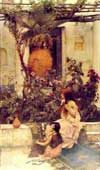
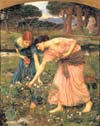
![Flora [white dress] (1890)](/paintings/thumbs_full/waterhouse_flora_02.jpg)
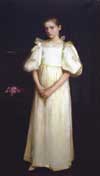
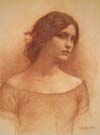

 I think so, Brain, but Pete Rose? I mean, can we trust him? - Pinky
I think so, Brain, but Pete Rose? I mean, can we trust him? - Pinky
 Current Waterhouse Posters Promotion
Current Waterhouse Posters Promotion
